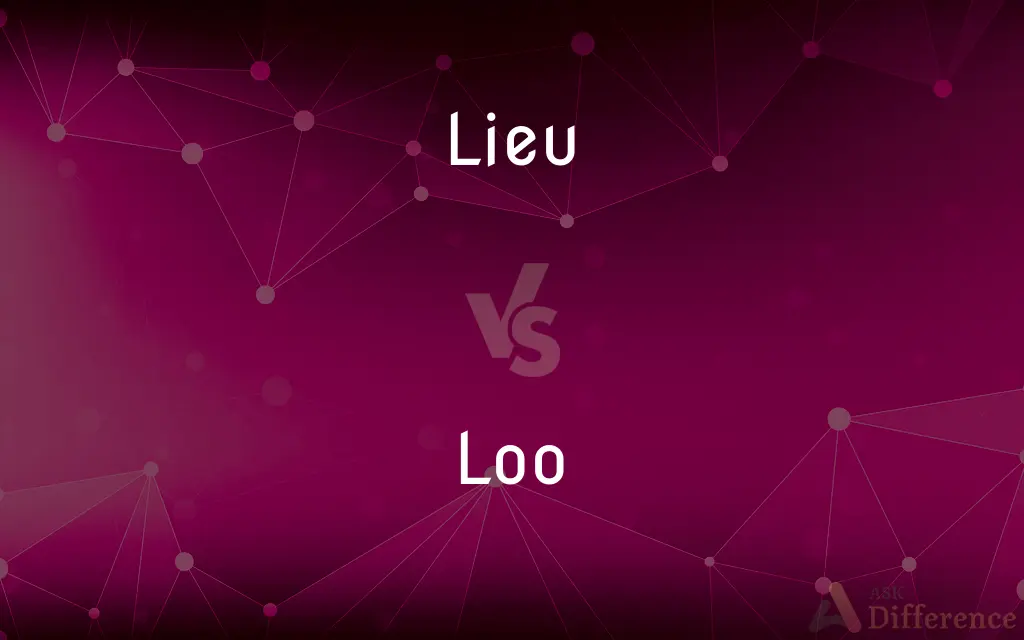Lieu vs. Loo — What's the Difference?
By Tayyaba Rehman & Urooj Arif — Updated on April 25, 2024
Lieu often refers to place or position in a phrase, like "in lieu of," whereas loo is a British term for a bathroom or toilet.

Difference Between Lieu and Loo
Table of Contents
ADVERTISEMENT
Key Differences
The word "lieu" is used primarily in formal contexts or set phrases to mean "instead" or "place," as in "in lieu of." Whereas, "loo" is a colloquial British English term that simply means "toilet" or "bathroom."
Lieu is derived from the French word "lieu," meaning place, and it retains a somewhat formal tone in usage. On the other hand, loo is believed to originate from the word "waterloo," a euphemistic term that became popular in British English.
In usage, "lieu" often appears in legal, formal, or corporate contexts, indicating substitution or replacement, e.g., "She received compensation in lieu of the standard benefits." Meanwhile, loo is used in everyday speech in the UK and some Commonwealth countries, referring to a restroom.
While lieu is a part of set phrases and has a limited scope of meaning, loo can be found in more varied informal expressions and humorous contexts, reflecting its role in everyday life.
The term lieu does not generally appear in casual conversation unless discussing specific contexts like agreements or arrangements. Loo, however, is commonly heard in British casual conversation, highlighting a cultural element in its usage.
ADVERTISEMENT
Comparison Chart
Meaning
Place, instead (in phrases)
Toilet, bathroom
Origin
French "lieu" (place)
Possibly from "waterloo"
Usage Context
Formal, legal, corporate
Informal, everyday speech
Common Phrases
"in lieu of"
None specific
Cultural Relevance
Limited to specific formal phrases
Widely recognized and used in British English
Compare with Definitions
Lieu
As a substitute or equivalent.
She was offered stock options in lieu of a higher salary.
Loo
Informal and colloquial use.
I need to visit the loo before we leave.
Lieu
A place or position.
The meeting was held in lieu of the regular conference room.
Loo
A toilet or bathroom in British English.
Where’s the nearest loo around here?
Lieu
Contextually as part of a formal arrangement.
The contractor received compensation in lieu of the originally agreed terms.
Loo
Used in British and Commonwealth countries.
There are signs to the loo down the hallway.
Lieu
In place of; instead.
He took a sabbatical in lieu of retirement.
Loo
Often used in light-hearted or humorous contexts.
He’s been in the loo for ages!
Lieu
Pertaining to a swap or exchange in terms.
Additional vacation days were granted in lieu of the end-of-year bonus.
Loo
A part of British cultural slang.
The children were taught to say loo instead of toilet.
Lieu
Instead
The company issued additional shares to shareholders in lieu of a cash dividend
Loo
A toilet
Loo paper
Lieu
Place; stead.
Loo
A gambling card game, popular from the 17th to the 19th centuries, in which a player who fails to win a trick must pay a sum to a pool.
Lieu
A place or stead.
Loo
A trick-taking card game in which each player contributes stakes to a pool and attempts to win at least one trick. A player who does not win at least one trick must add to the pool.
Lieu
Place; room; stead; - used only in the phrase in lieu of, that is, instead of.
The plan of extortion had been adopted in lieu of the scheme of confiscation.
Loo
A toilet.
Lieu
The function or position properly or customarily occupied or served by another;
Can you go in my stead?
Took his place
In lieu of
Loo
A cry to urge on hunting dogs.
Loo
To urge on with cries of loo or by other shouting or outcry.
Loo
(transitive) To beat in the card game lanterloo.
Loo
To pay a penalty to the pool for breaking certain rules or failing to take a trick in lanterloo.
Loo
To pay any penalty to any community.
Loo
: the card game.
Loo
The penalty paid to the pool in lanterloo for breaking certain rules or failing to take a trick.
Loo
An act that prompts such a penalty.
Loo
A game of lanterloo.
Loo
(figuratively) Any group of people.
Loo
A half-mask, particularly those velvet half-masks fashionable in the 17th century as a means of protecting women's complexion from the sun.
Loo
(India) A hot dust-bearing wind found in Bihar, Uttar Pradesh and the Punjab.
Loo
A lavatory: a room used for urination and defecation.
Loo
A toilet: a fixture used for urination and defecation.
Loo
(slang) A lieutenant.
Loo
An old game played with five, or three, cards dealt to each player from a full pack. When five cards are used the highest card is the knave of clubs or (if so agreed upon) the knave of trumps; - formerly called lanterloo.
Loo
To beat in the game of loo by winning every trick.
Loo
A toilet in England
Common Curiosities
What is the origin of the word "loo"?
It is believed to be derived from the word "waterloo."
Is "loo" used outside the UK?
Yes, it's also used in other Commonwealth countries.
What does "in lieu of" mean?
It means "in place of" or "instead of."
Is "loo" considered formal or informal?
Loo is considered an informal term.
Can "lieu" be used in everyday conversation?
It's typically used in more formal or legal contexts.
How do you use "lieu" in a sentence?
Example: "He was given an additional assignment in lieu of a raise."
What contexts are appropriate for using "loo"?
It is appropriate in casual conversation and informal settings.
What type of speech is "lieu" commonly found in?
Lieu is common in legal, corporate, or formal agreements.
Can "lieu" stand alone as a noun?
It rarely stands alone and is usually part of a phrase.
Are there any synonyms for "loo"?
Yes, synonyms include "bathroom" and "restroom."
Is "lieu" a French word?
Yes, it originates from the French word for place.
Share Your Discovery

Previous Comparison
Return vs. Refund
Next Comparison
Shinobi vs. NinjaAuthor Spotlight
Written by
Tayyaba RehmanTayyaba Rehman is a distinguished writer, currently serving as a primary contributor to askdifference.com. As a researcher in semantics and etymology, Tayyaba's passion for the complexity of languages and their distinctions has found a perfect home on the platform. Tayyaba delves into the intricacies of language, distinguishing between commonly confused words and phrases, thereby providing clarity for readers worldwide.
Co-written by
Urooj ArifUrooj is a skilled content writer at Ask Difference, known for her exceptional ability to simplify complex topics into engaging and informative content. With a passion for research and a flair for clear, concise writing, she consistently delivers articles that resonate with our diverse audience.














































